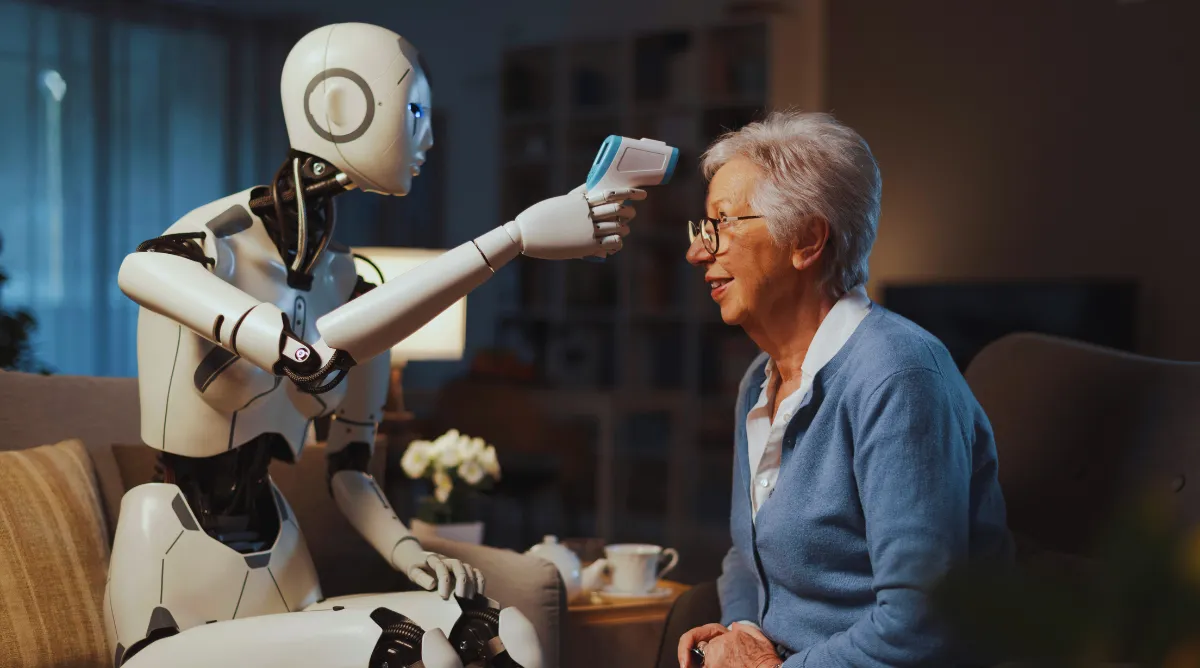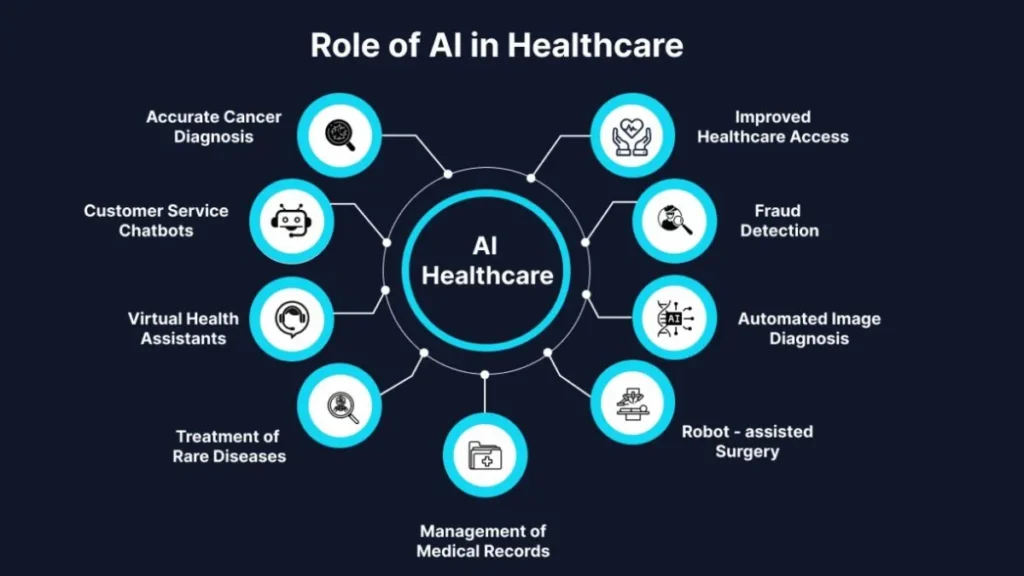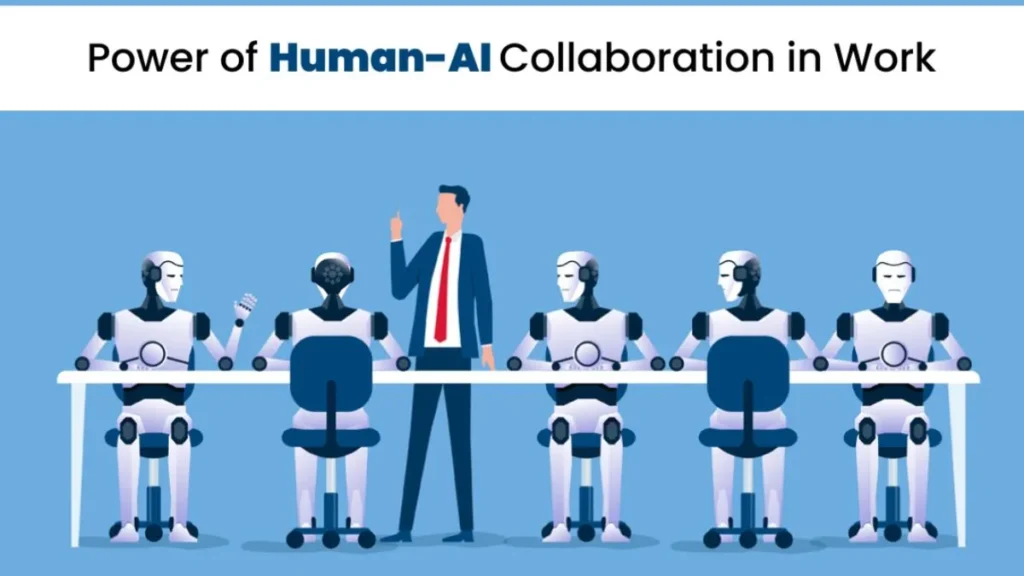
Artificial Intelligence (AI) is a hot topic in the market. It performs tasks that humans do, often faster and more efficiently. This AI technology is transforming various industries, including the healthcare sector. It helps doctors and health workers handle complex tasks more easily. AI also improves operations and simplifies routine jobs. These benefits lead to better patient care and less stress for healthcare workers.
Tech companies are investing heavily in AI to transform healthcare. Microsoft, for example, launched a $40 million program over five years to tackle major healthcare challenges using AI. The global spending on AI in healthcare is expected to skyrocket. It was $15.4 billion in 2022 and is projected to reach $208.2 billion by 2030. This represents a massive annual growth rate of 38.4%. These numbers highlight the incredible potential of AI to revolutionize the healthcare industry.
But Will AI replace doctors? As we know, Artificial Intelligence (AI) in the healthcare sector is in its early stages, but it has immense potential. AI-powered recommendation engines can benefit both doctors and patients in many ways. Today at TechVitara, you’ll comprehend this question. You’ll explore the importance of the human touch in healthcare.
Understanding AI in Healthcare
Artificial Intelligence (AI) is directed at computer systems that imitate human intelligence. Thus, AI in healthcare refers to using Machine Learning (ML) to improve patient experience. Furthermore, it streamlines hospital operations and expenses.
Current Applications of AI in Healthcare
AI technology is widely utilized in modern healthcare. But will AI replace doctors? Have a look at the key applications of AI in Healthcare sector:

- Diagnostics: Healthcare AI tools analyze medical images like X-rays, MRIs, and CT scans. They detect and classify conditions such as tumors, fractures, or other anomalies early.
- Patient Management: AI chatbots assist patients by answering queries and sending medication reminders. They also support chronic disease management through personalized and timely communication.
- Robotic Surgeries: AI-driven surgical robots enhance precision and safety in complex procedures. They reduce human error, minimize tissue damage, and speed up recovery time.
- Predictive Analytics: AI analyzes large datasets to predict patient outcomes and identify at-risk individuals. It aids in proactive planning for improved healthcare delivery.
- Virtual Health Assistants: Help patients book appointments, track health, and answer queries.
- Predictive Analytics: It identifies common symptoms. Furthermore, it predicts diseases based on patient data.
- Clinical Decision Support Systems: It provides real-time assistance to doctors. It suggests diagnoses or treatments.
Uses of Key AI Technologies in Healthcare
AI in healthcare relies on advanced technologies, including:
- Machine Learning (ML):With the help of ML, systems learn from data and improve over time. In healthcare, ML helps analyze medical data and identify patterns. It is used in diagnostics, drug discovery, and personalized treatments. Over time, it improves efficiency and patient outcomes.
- Natural Language Processing (NLP): AI processes and understands human language using advanced algorithms. It powers chatbots, speech recognition, and medical transcription, making interactions efficient and enhancing service accuracy.
- Computer Vision: AI analyzes medical images like X-rays, MRIs, and CT scans. Using deep learning, it helps detect anomalies and supports doctors in making precise diagnoses.
Also Read: Latest AI Technology Trends in the USA in 2025
Types of AI used in Healthcare Sector
Have a look at the types of AI used in healthcare sector:
| Aspects | Narrow AI | General AI |
| Description | Focused on specific tasks or activities. | Aims to replicate human-like intelligence across multiple tasks. |
| Stage | Widely used and implemented in healthcare today. | Still in the Research and Development stage. |
| Applications | Disease diagnosis, patient data management, imaging analysis, personalized treatment plans. | Potential future applications in Decision-making, Multidisciplinary Treatment Planning, and Autonomous Patient care. |
The Role of Healthcare Providers
Healthcare practitioners play a crucial role in society. They diagnose, treat, and care for their patients. Their services assist people to live healthier and longer lives. Have a look at the responsibilities of Healthcare Providers.
- Doctors are primarily concerned with disease diagnoses. Furthermore, they assist with treatments, surgeries, etc.
- Nurses care for patients and monitor their condition. Moreover, they also offer emotional support.
- Next allied health professions. These include therapists, technicians, etc. They assist with treatment and recovery.
Human-Centered Care
Healthcare is not just about medicines and procedures. It is also about understanding and caring for people. Empathy, good communication, and building trust are essential. The human touch makes healthcare personal. A kind word or a gentle approach can ease fear and pain. This connection improves healing and builds confidence.
Building Relationships with Patients
Compassion and faith amplify patient-provider relationships. Patients must feel cared for and understood. Then, they are more likely to share their concerns. Moreover, they easily follow the provider’s advice.
Healthcare providers maintain patient’s physical and emotional needs. They guide patients through difficult decisions. Furthermore, they also support them during their tough times. Their expertise and compassion drive a big difference.
AI’s Strengths and Limitations in Healthcare
AI brings new opportunities to improve care and efficiency. But, like any technology, it also has limitations. Balancing these is key to making the most of AI in healthcare.
Strengths of AI in healthcare
Have a look at the AI’s strengths in healthcare:
- Efficient Data Analysis: AI can quickly process and analyze large amounts of medical data. It identifies patterns and predicts diseases accurately.
- Enhanced Decision-Making: AI supports doctors by providing data-driven insights. It helps create accurate treatment plans based on medical evidence.
- Improved Access and Cost Savings: Healthcare AI tools make healthcare more affordable by automating tasks. They also improve access to care, especially in remote areas.
Limitations of AI in healthcare
AI’s limitations in healthcare:
- No Emotional Connection: AI lacks empathy. It can’t understand human emotions. Unable to provide the emotional support patients often need.
- Ethical Concerns: Privacy and security of patient data are critical considerations in AI decisions. Furthermore, transparency is also an issue.
- Difficulty with Complex Cases: AI struggles with cases that are ambiguous or highly unique. It cannot replace human intuition and experience in such situations.
Also Read: How AI-Powered Marketing Tools are Revolutionizing Startups in the USA
Will AI Replace Healthcare Providers? Exploring the Possibilities
AI helps diagnose diseases, manage patient data, and even predict illnesses. However, it’s unlikely to replace healthcare providers fully. AI is more likely to change how they work. It makes processes faster and more efficient. Have a look at the sectors that are likely to be impacted:
- Radiology: AI can analyze medical images quickly. Such as X-rays, MRIs, etc.
- Diagnostics: Healthcare AI tools like chatbots and algorithms identify symptoms and suggest treatments.
- Surgery: AI-powered robots assist in precision surgeries.
- Administrative Tasks: Automating tasks like patient scheduling and data entry.
AI will not replace the need for healthcare providers. Instead, it will transform roles. It enables practitioners to concentrate on patient care.
The role of AI in complementing healthcare providers
AI works as an assistant as it helps providers by automating repetitive tasks. Such as: paperwork, appointment management, etc. It enhances diagnostic accuracy.
AI improves healthcare by reducing errors in diagnosis and treatment. It speeds up processes like lab test analysis.
Human-AI Collaboration

AI and humans work best hand-in-hand. For example:
- Multidisciplinary care teams can use AI insights. It improves decision-making.
- Surgeons use Healthcare AI tools for accuracy. It becomes helpful during complex procedures.
- Providers can focus on empathy and communication. While AI handles data-driven tasks.
Ethical Considerations and Challenges in AI in Healthcare
AI has great potential in healthcare. Yet, it brings some essential ethical challenges. Here are some key issues to consider:
Ethical dilemmas posed by AI in healthcare
- Artificial intelligence systems learn from the data on which they are trained. If the data contains biases, the AI may reflect or even increase them. It can lead to unfair treatment of specific patient groups. For example, some populations may obtain less accurate diagnoses or treatment.
- Many AI models, particularly complex ones, function as black boxes.” It means their decision-making processes are difficult to understand. In some cases, doctors and patients hesitate to trust AI. A lack of transparency might also make it difficult to detect problems.
Regulatory and Legal Challenges
- Laws and guidelines often lag behind the speed of AI innovation. Healthcare systems need updated policies to address AI-specific risks.
- Accountability is a lag in case AI makes a mistake. Then, it’s unclear who is responsible. Should it be the developer, the healthcare provider, or the hospital? The lack of clarity raises legal and ethical concerns.
Privacy and Data Security
- AI relies on large amounts of patient data to work well. It raises concerns about how securely this data is stored and used. Maintaining patient anonymity is crucial. Healthcare systems must adhere to severe privacy requirements. Like HIPAA and GDPR.
Also Read: Best Wearable Fitness Trackers in the USA in 2025
The Future of Healthcare Providers in an AI-Driven World
AI is not replacing providers but transforming their roles. Routine tasks like data entry and diagnostics are becoming automated. It enables physicians to focus on more sophisticated care. They will devote more effort to tailored and preventative therapies. The emphasis is shifting toward patient-centered care.
Training for an AI-Integrated Environment
Healthcare workers must adapt to Healthcare AI tools. Training programs will teach them to work with AI systems. It includes understanding AI outputs and using them in decision-making.
Workforce Transformation and New Opportunities
AI will create new career paths in healthcare. Roles like AI specialists, health data scientists, and informatics experts will grow. Providers can upskill to move into these roles. It opens opportunities for those interested in technology.
Upskilling for the AI Age
Ongoing learning is essential in the AI-driven healthcare world. Courses in AI, data analysis, and informatics will be vital. Providers who upskill can stay relevant and advance their careers.
Conclusion
AI is an essential tool in healthcare. AI in healthcare improves process efficiency. Furthermore, it enhances patient care. No way AI replacing healthcare providers.
The current and future of AI in healthcare reflect working alongside. They work together to achieve better outcomes. This collaboration, which brings together technology and human skills, will determine the future of healthcare.
FAQs on AI in Healthcare:
Q. How is AI transforming healthcare providers' roles?
AI is helping with tasks like organizing data and analyzing tests. It also supports doctors in diagnosing and planning treatments. It allows providers to focus on patients.
Q. Will AI take over the jobs of doctors and nurses in the future?
AI will not replace doctors or nurses. It will handle repetitive tasks. While humans still make important decisions and provide care.
Q. Can AI be trusted to make critical healthcare decisions?
AI can help with decisions by analyzing large amounts of data. However final decisions need human oversight. It is critical to ensure safety and accuracy.
Q. What are the potential risks of AI in healthcare?
If AI is fed incorrect data, it is prone to errors. It also raises worries about patient privacy and potential prejudice in how it operates.
Q. How will healthcare providers work with AI in the future?
Doctors and nurses will use AI as a tool to help with diagnoses and treatment. It will make their work faster and more efficient, but they will stay in control.
Q. What are the limitations of AI in healthcare practice?
AI doesn’t have human empathy or creativity. It can struggle with rare or complex cases and depends on good data to work well.
Q. How will AI impact the patient-provider relationship?
AI can save time by handling routine tasks. However, relying too much on AI might reduce personal connection.







Alright guys, this jackpotlandapp is one of the best things that has ever happened to me. Not a big deal, but I won some amazing rewards recently. Definitely a 5/5. Click here to play jackpotlandapp
Yo, just stumbled onto vin88win. It’s pretty slick and has more stuff than I expected. Definitely worth a look if you’re checking out different sources. Just sayin’: vin88win
Деятельность в области недропользования — это направление деятельности, связанный с освоением природных ресурсов.
Оно включает разведку минерального сырья и их промышленное освоение.
Эта отрасль регулируется установленными правилами, направленными на охрану окружающей среды.
Ответственное ведение работ в недропользовании обеспечивает устойчивое развитие.
оэрн официальный сайт
Fala, apostadores! Tô buscando um app novo pra dar uns palpites e me indicaram o DonaldBetApp. Alguém usa? Acha que vale a pena baixar? Me contem! Se quiserem saber mais: donaldbetapp
I checked out 777bet10 because it advertised some quick withdraws. It’s pretty solid, and I have had no problem withdrawing yet. Come play at 777bet10 now!
ICGbetlogin makes it so easy to log in and get ready to win. I have enjoyed the bonuses they give out. Try icgbetlogin today!
Downloading Yolo247download has been great. The smoothness is perfect and the game play seems fair. I play it almost daily. Check yolo247download to see what its about!
GG777a is legit! I’ve cashed out a couple of times with no issues. That’s a win in my book! Go get yours: gg777a
Heard good things about gg7771. Thinking about trying it out this weekend. Anyone got any recommendations on which games to play? Level up your game: gg7771
9phwin! My lucky spot! Seriously, I win more here than anywhere else. Give it a shot, you might get lucky too! Spin to win: 9phwin
Регулярное выполнение домашних заданий имеет большое значение в образовательном процессе.
Домашняя работа помогает повторить пройденное и глубже разобраться в предмете.
Со временем ученики формируют ответственность.
Регулярные задания приучают эффективно управлять временем.
https://rdt.org.ru
Кроме того, домашняя работа способствует развитию умение принимать решения.
Школьники становятся более уверенными на занятиях.
В дальнейшем выполнение заданий оказывает хорошее влияние на качество обучения.
В итоге домашние задания остаются неотъемлемым элементом школьного обучения.
Умение одеваться со вкусом является значимым фактором в повседневной жизни.
Она позволяет подчеркнуть индивидуальность.
Гармоничный стиль поддерживает уверенность в себе.
Одежда нередко является частью невербального общения.
https://telegra.ph/Self-Portrait-plate-kak-vyrazhenie-haraktera-01-30
Кроме того, продуманный гардероб упрощает выбор в повседневных делах.
Постепенно внимание к стилю формирует привычку.
В итоге стильная одежда остается элементом современного образа жизни.
Ответственная гемблинг — это набор строгих правил и практик.
Она ориентирована для защиту игроков от рисков.
Основная цель — сохранить игровую сущность исключая ущерба в отношении благополучия человека.
https://t.me/s/top_onlajn_kazino_rossii
Это подразумевает контроль над временем и бюджетом, тратящимися в азартных играх.
Существенным элементом служит понимание игроком имеющихся возможных последствий.
Платформы должны предоставлять честную информацию и средства для самоограничения.
В итоге, безопасная игра формирует здоровую игровую атмосферу со стороны всех сторон.
Получение вида на жительство за границей имеет ключевое значение.
Оно предоставляет законную возможность на длительное проживание в выбранной державе.
получение ВНЖ через анал
Такое разрешение гарантирует доступ к национальному медицинскому обслуживанию и образованию.
Наличие ВНЖ значительно облегчает процедуру банковского сотрудничества и ведения своего дела.
Таким образом, данное удостоверение является первым этапом к постоянному проживанию или даже второму гражданству.
https://t.me/s/ed_1xbet/682
https://t.me/s/officlal_1win/306
нейросеть для студентов онлайн нейросеть для студентов онлайн .
нейросеть реферат онлайн нейросеть реферат онлайн .
нейросеть студент бот нейросеть студент бот .
ии для студентов ии для студентов .
лучшая нейросеть для учебы nejroset-dlya-ucheby-8.ru .
нейросеть для учебы онлайн нейросеть для учебы онлайн .